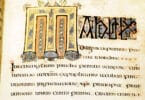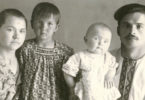If you have eastern European or Middle Eastern ancestry, it is pretty likely that you will, at some point, come across a Jewish surname in your family tree. Knowing the meanings of these surnames will help you understand this branch of your family better, what their lives were like, maybe a little bit about what their personalities were like, and about the Jewish experience in general. It is just as much a part of your family history as any other branches, and therefore important for a genealogist to know. Here is what you need to know about Jewish surnames and their meanings.
The history of the Jewish people is a long and complex one, filled with a lot of turmoil punctuated by brief periods of peace and tranquility. It also goes back thousands of years. According to their own oral history, which later became the Old Testament/Torah, they began with Abraham, around four to five thousand years ago in the Middle East. From there, they made their way through Isaac, Jacob, Joseph, slavery in Egypt under the pharaohs, Moses, the Promised Land, the Babylonian Exile, the siege of Jerusalem, occupation by the Romans, and the destruction of their most holy temple.
After the destruction of the temple by the Romans, which was actually the second temple destruction the Jewish people had endured in Jerusalem, the Twelve Tribes of Israel, which comprised the Jewish people, were dispersed from the Promised Land after generations of occupation. The Romans sent them away from their ancestral land. After this, they roamed the world for a time, in what was known as the Great Diaspora. The Jewish people ended up moving out around the world.
This was around the first and second century A.D. After a thousand or so years of wandering, most of the Jewish people had settled into either Eastern Europe or the Iberian Peninsula. Those in Eastern Europe lived in what is now Germany, Poland, and Austria. Those on the Iberian Peninsula lived in what is now Portugal and Spain. Those in Eastern Europe became known as Ashkenazi, and those on the Iberian Peninsula became known as Sephardic.
Ashkenazi and Sephardic Jewish people didn’t have much to do with each other, and their cultural traditions diverged widely. Because of this, when surnames came into use in Europe, the surnames of the two different Jewish groups were quite dissimilar from each other.
Early in their history, before coming to Europe, surnames were not necessary among the Jewish people, and it was the same with most ancient cultures (with a few exceptions). When surnames did become necessary, due to increasing populations in the cities, and people moving to places far from their ancestral village in search of economic opportunities, Jewish people often used patronymic surnames to show pride in their parentage and religious heritage.
However, some Jewish families did this even before the common adoption of surnames in Europe, when they were still wandering the world after the Great Diaspora. And, some of these early patronymic surnames are still being used today. “Ben,” followed by the name of the father, or “Bat,” followed by the name of the father, meant “son of” and “daughter of,” respectively. They were the earliest Jewish surnames and even predated the use of European surnames in some Jewish families.
Later, those in the Jewish culture who held religious offices adopted surnames on occasion (though not always). The surnames Cohen and Levi are the two most common Jewish surnames that denote a religious or priestly lineage. Common variations of these names are Cohn, Katz, Kohn, Kahneman, Kahane, Kaplan, Lewin, Lewinson, Levitas, Levitt, and Levine.
Ashkenazi Jewish people typically adopted surnames similar or identical to the ones their Gentile neighbors in Eastern Europe were using, when surnames came into fashion. That is why you will find many Ashkenazi Jewish surnames that denote occupations or geographical locations, just like other people living in this area at the time used. Others used descriptive surnames, which was a pre-Christian tradition in parts of the ancient world that occasionally used surnames.
Common Ashkenazi surnames include Goldberg (describing people from the town of Gold in medieval Poland), Schneider (meaning “tailor,” which was an occupation), and Geller (which is Yiddish for someone with blonde hair).
Ashkenazi Jewish people also adopted surnames in the Middle Ages based on the names of precious stones, which was not a common practice among other European ethnic and cultural groups. That is why Jewish surnames like Goldman, Weiss, Gold, and Green are so common today.
As for the Sephardic Jewish people, they mostly adopted Spanish surnames in order to escape persecution during the Spanish Inquisition. King Ferdinand and Queen Isabella of Spain declared in 1492 that all Sephardic Jewish people had to register with the crown before being expelled from the country. While many chose to register and go, others preferred to stay, and adopted Spanish surnames to blend in with the local population. Those who left usually went to North Africa, where they adopted Turkish and Arabic surnames, also to blend in with the locals and avoid persecution, as persecution of the Jewish people was going on there, too.
Other common Jewish surnames, dating from both ancient and Medieval times, include:
Abrams — deriving from Abraham, the patriarch of the Jewish people
Blau — An Ashkenazi name, it means “blue” in German
Horowitz — Referring to someone from the community of Horovice in the Czech Republic
Lieb — Meaning “lion,” this refers to someone who had an ancestor who was brave and/or strong to an unusual degree
Roth — Meaning “red,” it is used to describe someone’s complexion or hair
When you know the meaning of your Jewish surnames, you will have a much better understanding of your ancestry and ancestors. Whether Ashkenazi, Sephardic, or a different group entirely (such as the small group of Jewish Ethiopians), the surname tells the story of the family going back to Medieval, or even ancient times. Its meaning is well worth knowing to any genealogist.






